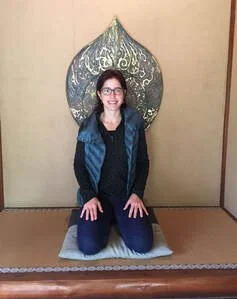Becoming Acupuncturists, Part 1
HEALING AND BECOMING A HEALER, WITH ACUPUNCTURE
(By Grace Rollins, MS, LAc) My studious habits as a kid landed me in an elite boarding school and later on an Ivy League college. In this academic utopia I adopted the habits of overachievers, both healthy and unhealthy. I learned how to put in very long hours to accomplish goals; but at the same time, how to entirely disregard natural circadian rhythms (pulling "all nighters", operating on very little sleep, and eating at highly irregular times). I learned how to make exercise a frequent part of my routine, but also how to "train through pain" and use stimulants like coffee and junk food to keep going.
My lessons in the Type A lifestyle continued when I graduated and began to work long hours in the nonprofit sector, where our work "was never done." The pattern was to fuel ourselves with coffee, pastries and anxiety, work ourselves silly, and then go out for lots of beers at the end of the week to decompress. It's the kind of routine that gradually chips away at your vitality.
I wasn't even half-way through my twenties when I started to feel the way a lot of middle-aged white-collar workers feel: sluggish, unfocused, often sleepy during the day; always in need of stimulants like coffee and sugar; suffering aches and pains from inflammation, poor posture and repetitive strain. I had acne that seemed to be getting worse with age, not better. I was even on three drugs: two different long-term antibiotics a dermatologist had prescribed me, plus birth control pills. So now I was getting side effects like yeast infections, dry eyes and light sensitivity. I didn't have the knowledge in those days to pursue other options.
I'm pretty sure if I hadn't found a good acupuncturist I would have ended up on more drugs to try to alleviate all these nagging symptoms (or to take care of side effects). A co-worker told me she had seen a local Japanese-style acupuncturist to help with her menstrual cycle-- within a few sessions she had gotten her period back after a several month hiatus. That seemed pretty irrefutable so I decided to give it a try.
My first impression with the acupuncture session was how subtle it felt-- the gentle palpation, the dull, spreading feeling from a few gently inserted needles, the aromatic scent and focused heat of tiny moxa cones. Afterwards I felt a sort of zoned-out relaxation, and some odd (but not unpleasant) sensations in my body. I remember laying that night with my hand on my belly and feeling as if it had disappeared into the center of my abdomen, like it was drifting into a black hole. My body was undergoing a process of waking up and reorganizing.
With a few weekly sessions of this reorganizing, my energy and stamina bounced back, my skin improved, and my aches and pains melted away. Apart from symptomatic relief I noticed something unexpected: a strong impulse to reorganize my life to be more in tune with my physical nature. On an almost spiritual level I felt compelled to eat better, get off the drugs I was taking, and make better choices about my sleep and work habits. Out of nowhere I decided to start training a martial art, Aikido, which right away felt like "home" and ended up becoming a huge force in my life. It was as if I was sailing a boat that had caught a fortuitous wind in exactly the direction I needed to go. All this because of some tiny needles and moxa stimulating my skin?
Perhaps carried by that same fortuitous, moxa-scented wind, I couldn't help but start to read voraciously about acupuncture. I found it had a fascinating, unique history with roots in Chinese shamanism, philosophy and empirical research. It had evolved through countless cultural and political eras, continuing to enrich and diversify with each generation, being passed on through teacher-student lineages over the course of nearly three millennia! Acupuncture had spread from China to every part of the world, and in recent decades had even begun gaining traction among the modern medical community-- an unparalleled feat in the history of medicine.
In addition to acupuncture's fascinating history and, from my direct experience, effectiveness, one of the things that inspired me to keep learning about it was how it stood in contrast to conventional medicine. On one hand you have the modern approach of controlling disease and dysfunction by attempting to compensate for the body's weaknesses (mainly with drugs and surgical intervention). On the other, a practice of harmlessly stimulating the body to engage the natural healing abilities intrinsic in each person.
As I came to see this contrast, I also came to see the workaholic road I had been walking and where it would lead me. Not only did I want to walk a better path for myself; I became excited by the prospect of one day being able to share this kind of healing with others. In waking up to the possibility of self-healing, we can also discover how to escape the continual self-injury caused by poor lifestyle choices. Over a decade later, my secret thrill is not just helping symptoms, not just healing an injury or a syndrome, but helping people to put their humanity back together.
As the owner of a busy clinic my work is once again "never done," and I still get pulled into the current of overachiever culture. But if any of you know my personal habits you know how much I walk the walk. For all the Yang I express in my life (long clinic days, physical training, apprenticing, studying), I also cultivate Yin (quality diet, sleep, meditation, art, yoga). Also, getting some acupuncture from time to time still helps to set me right.

